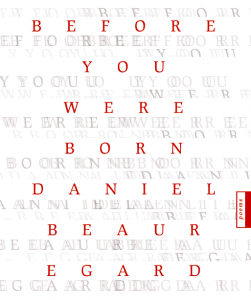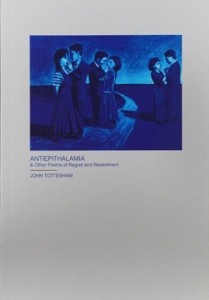Daniel Beauregard Release Day Interview Party!
 Today, my new press, 421 Atlanta, releases Daniel Beauregard’s debut chapbook, Before You Were Born. First things first: you can order it here, or here if you want to get a great deal on both it and Publishing Genius’s newest chapbook release, The Kids I Teach by Andrew Weatherhead and Mallory Whitten. Speaking of Publishing Genius, I thought I’d take a page from PGP man (& BYWB designer) Adam Robinson’s playbook and post a quick but savory Q&A with my author so that HTMLGiant readers can get to know him a little better! It was really interesting to think about Daniel’s poetry as an interviewer instead of as a publisher, and I was very excited to see his thoughtful and candid answers to my questions. And here they are!
Today, my new press, 421 Atlanta, releases Daniel Beauregard’s debut chapbook, Before You Were Born. First things first: you can order it here, or here if you want to get a great deal on both it and Publishing Genius’s newest chapbook release, The Kids I Teach by Andrew Weatherhead and Mallory Whitten. Speaking of Publishing Genius, I thought I’d take a page from PGP man (& BYWB designer) Adam Robinson’s playbook and post a quick but savory Q&A with my author so that HTMLGiant readers can get to know him a little better! It was really interesting to think about Daniel’s poetry as an interviewer instead of as a publisher, and I was very excited to see his thoughtful and candid answers to my questions. And here they are!
How did dreams, objects, and found texts interplay with your process in writing the poems in your new chapbook?
Dreams played a very large role in writing the poems found in “Before You Were Born.” In a way I feel many of the poems were dictated to me through my subconscious—at times I woke in the middle of the night after a dream and the dream became the poem. Other times, things came more sporadically, a line at a time. When I added the lines together they made sense. Or they didn’t. I have a dry erase board next to my bed and if something comes in those hours between waking and dreaming that is important to me, I straggle out of bed and write it down usually without turning on the light. Then I go back to bed or, if the lines keep coming, I’ll turn the light on. Objects played a large role in writing the poems as well. I was obsessed with the way things can be continuously broken down then built into something new. Like an atom bomb or a pulsar. I didn’t rely on found text in these poems as much as I have in my more recent work. However, there are a lot of bits and pieces I’ve picked up along the way that have wedged their way into the poems—conversations, arguments, emails.
And how about The Simpsons?
The Simpsons is always somewhere inside me D’oh. There aren’t many references to the show in “Before You Were Born” but I did steal a line from Superintendent Chalmers. It’s from a scene when Chalmers and Principal Skinner are walking in the parking lot and Chalmers shows Skinner his new car. Skinner says: “It gets me to from A to B—and on weekends, point C.” I do have several other poems that reference the show though.
There’s something about the poems in Before You Were Born that seems, not personal exactly, but private. How do you think about audience and the reader?
There is something that’s a little private in those poems because, in a way, it’s asking the reader to take a step into my mind—to see the things that I obsess over; the things I rant about. Tiny particles. Dust being bits of skin. Swamp lights and the souls of dead children. I don’t like to think about the audience and the reader too much. I like the idea of the reader looking into a glass house. You can throw whatever you want at it but the house will stand or melt into something else, all the while a part of me will remain. These poems are an exercise in understanding myself—they are very much selfish.
What are you working on now?
Lately I’ve been interested in how caves can be used as a larger metaphor for language. I haven’t thought too much about it yet but I’ve begun studying caves via various texts and hopefully over the next few months I can visit some caves myself. I’m interested in how life can thrive in the depths of these caves without any sunlight—bacteria, viruses, extremophiles—not exactly sure where it will go but I’ll continue playing with the idea of desiccation, dissolution and creation. I’ve also got another project titled “HELLO MY MEAT” that I finished recently. It’s a series of loose sonnets created from words and phrases found in various anatomy texts, letters from sea, captain’s logs, butcher manuals and sea diaries from the early 1900s.
A Close Reading of a Poem By a Girl
While being educated upon literature, one of the most marvelous assignments I received was to conduct a close reading of a poem of my choosing. Though 99 percent of the people who associate themselves with literature nowadays probably perceive poems as mere documents that they’re coerced to comment upon in workshop, I am mesmerized by beatific poems, and I believe each one necessitates thoughtful evaluation. After all, when you see a beautiful look by, say, Calvin Klein, you shouldn’t just mumble “Nice job, Calvin” and then zip right along to the next one — that’s inconsideration. What everyone should do is concentrate on the look exclusively in order to notice the particular shade of grey and the way in which the squiggly white stripes contrast those of the grey ones.
The same should be so for a poem.
The poem I selected to do my close reading with was Charles Churchill’s night. An 18-century poet who didn’t like gay people, Charles is often ignored, while poets like putrid pragmatist Alexander Pope are emphasized. But, really, Charles needs ten times the heed of Alexander, as Charles is ten times as terrific as Alexander.
For Charles, the greater public views the daytime as the place of hardworking humans and the nighttime as the space of a sordid species. But in his poem, Night, Charles says that daytime is much more foul than nighttime. Using heroic couplets, Charles explains why the daytime is contemptuous, calling its denizens “slaves to business, bodies without soul.” In contrast to the spiritless stupids, those who wander in the night have an “active mind” and enjoy “a humble, happier state.” Near the end Charles states, “What calls us guilty, cannot make us so.” While I concur with Charles that just because the 99 percent say it’s true doesn’t make it true, I don’t agree that the nighttime is so wonderful, as gay people go out at night a ton, and gay people aren’t a thinking bunch.
But Charles’s poem is still bold, bellicose, and abrasive, and all of those traits are laudatory, and, through my close reading, I became much better acquainted with them.
Also disseminating a decided amount of close reading are the baby despots of Bambi Muse. Baby Adolf did one on Emily’s “Presentiment,” Baby Marie-Antoinette did one about Edna’s “Second Fig,” and Baby Joseph did one concerning William’s [“so much depends”].
Close readings appear to be very vogue. So, having already summed up a close reading of a boy poet, I will presently present a close reading of a girl poet.
September 24th, 2013 / 1:29 pm
An Interview With John Tottenham
 I met John Tottenham at a party hosted in an arcade in March 2012. He approached my friend and asked for a beer from the case she was carrying under her arm. “Let me have one of those,” he said in his British accent. She looked over to me, rolled her eyes and begrudgingly handed him one. “Yes, thanks,” he muttered, pivoting quickly to wander away.
I met John Tottenham at a party hosted in an arcade in March 2012. He approached my friend and asked for a beer from the case she was carrying under her arm. “Let me have one of those,” he said in his British accent. She looked over to me, rolled her eyes and begrudgingly handed him one. “Yes, thanks,” he muttered, pivoting quickly to wander away.
“What an asshole,” my friend mumbled.
I later saw him standing in a dark corner, alone, his eyes half-drawn, leaning on a pinball machine. He looked absolutely miserable. I laughed to myself. His display soothed my own misery. I had been looking for a way home since I arrived.
Six months later, John’s second collection of poetry – Antiepithalamia: And Other Poems of Regret & Resentment – was released on my press, Penny-Ante Editions.
I spoke with John via email.
***
Rebekah Weikel: Your work seems to be embraced by people who don’t normally read poetry.
John Tottenham: Which automatically dooms it to obscurity. All poetry, of course, is automatically doomed to obscurity, but to produce work that is accessible is to make it inaccessible to critics. It leaves them with nothing to do. And the critic has pulled off the outrageous feat of raising himself to the level of the artist and somehow making himself indispensable. But if there’s a direct line between poet and reader, then the critic becomes irrelevant, it could drive them out of business. Clarity is also anathema to people who are steeped in critical theory. The waters must be muddied to make them appear deeper, to give the serious readers and theoreticians something to fish for. Critical theory is a lot of fun but that’s all it is, fun: precisely what it’s supposed to not be. It’s a game for the overeducated. Nobody’s going to go there for wisdom, guidance, solace.
RW: You often write in the first person, but there’s also a contradictory quality.
JT: That’s due to the thorny issue of the unreliable narrator in poetry. It’s something one can get away with in prose – which, for example, Nabokov and Iris Murdoch do very well. But it’s difficult with poetry. People automatically assume that if you’re writing in the first person, you’re being confessional, especially if you’re addressing matters of the heart. I never sit down with the intention of writing a poem about anything or anybody in particular. The way I work is more like surgery or sculpture – a long process of accumulating notes, then chipping away, taking apart, piecing back together.

